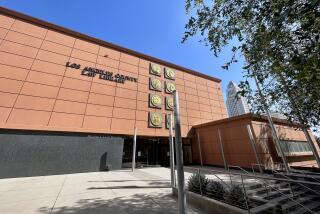Guide for Success During Courthouse Research
- Share via
There comes a time in every genealogist’s life when a trip to a county courthouse is necessary. Nothing beats on-site research and the examination of original records.
Before you go, do your homework. Take your pedigree charts and family group sheets and make a list of names and dates of events and which records you need to consult in that county. If possible, put them in alphabetical and chronological order: alphabetical to help you to check off the names as you research, and chronological because the records you will be examining are arranged that way.
Recheck the dates that you plan to be at a courthouse. Watch out for holidays. Courthouses are usually open Monday through Friday, but hours vary. Many small courthouses close for an hour at lunchtime. Decide in advance your priorities.
Check marriages, wills and probate, deeds, births and deaths (if available), divorces and miscellaneous records, which can be anything from animal brands to voter registrations.
Tips for successful courthouse research:
* Wear comfortable but appropriate clothes, preferably something washable because books and records are often dusty. Be prepared to climb ladders to reach an old book that weighs 20 pounds or to go to a basement decorated with cobwebs.
* Carry a briefcase or folder. Act professional; be courteous.
* Don’t bore the clerks about your ancestors. Simply ask politely where the specific indexes and books are.
* Do not touch records with a pencil or pen or make any marks.
* Do not run your finger down the indexes; don’t rest your arms on printed pages.
* Do not eat, drink or smoke where the records are stored.
* Put all books back as you finish them.
* Be prepared to pay high prices for photocopying. Bring money in small denominations as clerks seldom can change $20 or $50 bills. Clerks don’t set the prices, so it does no good to complain.
Marriage records are the most frequently needed records. They will have a direct index (alphabetical by surnames of the bridegrooms) and an indirect or reverse index (names of the brides). These indexes may be in separate books, or in the front and back of the same book. Turn to the letter you want in the direct index. Names will not be in strict alphabetical order. Copy every reference to your surnames. Do the same for the reverse index. Errors abound in indexes, so check both. In Southern records check both “whites” and “colored” marriages--many books have been rebound and mislabeled.
When you finish copying every reference to all your surnames, look up the marriage records in the books. If possible, photocopy them. While expensive, this saves time and eliminates errors of hasty transcription.
Check the Index to Wills, Probate and Estates, and copy every reference.
Deeds are indexed by grantor (seller) and grantee (buyer). Check both and write down every reference. If your ancestor has many references in these records, obtain photocopies for later study. The most important deeds are the first one in the grantee book and the last entry in the grantor records. The first deed to property purchased usually tells the place a person lived before moving to that particular county, and the last deed may be when he sold property to move on. These are critical dates.
Some courthouses have birth and death records. Ask about these. Divorces are considered civil suits and will be filed where the civil and criminal lawsuits are kept. Ask where those records are kept--they usually are in another office at the courthouse.
Be sure to thank the clerks for their assistance. Good manners are part of being a good genealogist.

